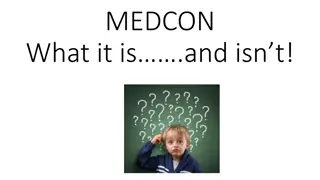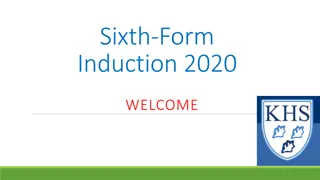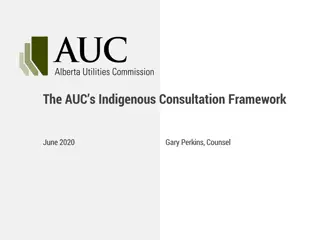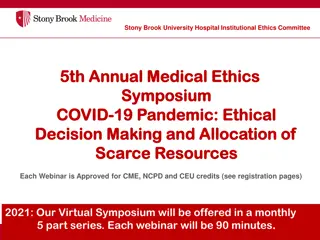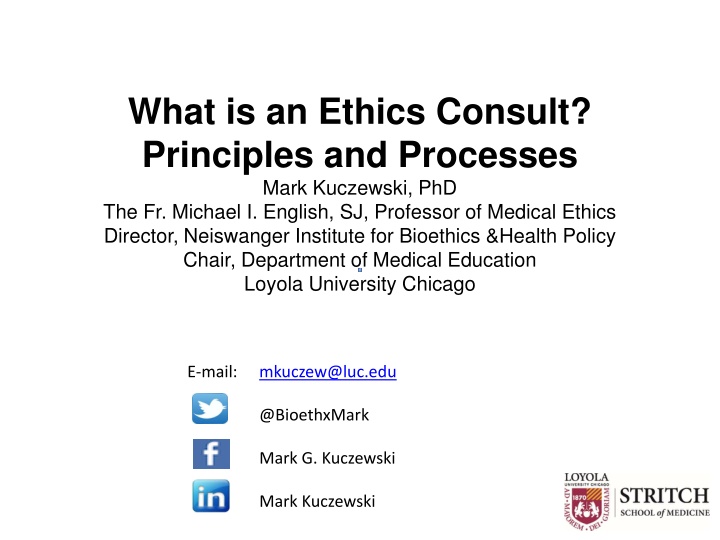
Ethics Consultation Process: Case Study of Mrs. Czarniwicz
In this case study, Mrs. Czarniwicz's complex medical situation prompts the involvement of an ethics consultation service. The patient's deteriorating condition raises challenging ethical considerations for the medical team and family members, highlighting the role and importance of ethics consultants in navigating difficult healthcare decisions.
Download Presentation

Please find below an Image/Link to download the presentation.
The content on the website is provided AS IS for your information and personal use only. It may not be sold, licensed, or shared on other websites without obtaining consent from the author. If you encounter any issues during the download, it is possible that the publisher has removed the file from their server.
You are allowed to download the files provided on this website for personal or commercial use, subject to the condition that they are used lawfully. All files are the property of their respective owners.
The content on the website is provided AS IS for your information and personal use only. It may not be sold, licensed, or shared on other websites without obtaining consent from the author.
E N D
Presentation Transcript
What is an Ethics Consult? Principles and Processes Mark Kuczewski, PhD The Fr. Michael I. English, SJ, Professor of Medical Ethics Director, Neiswanger Institute for Bioethics &Health Policy Chair, Department of Medical Education Loyola University Chicago E-mail: mkuczew@luc.edu @BioethxMark Mark G. Kuczewski Mark Kuczewski
What Do We Want to Know? 1.What do ethics consultants do? 2.How does one become an ethics consultant? 3.How is skill at ethics consultation demonstrated?
A Typical Ethics Case Consultation Scenario Mrs. Czarniwicz was a 67-year-old woman who was diagnosed as having non-resectable colon cancer six months ago. When that diagnosis was made, it was clear that the patient would eventually die but it was, understandably, not clear exactly when. This is the most recent of several admissions from a nearby nursing home for episodes of sepsis (infection) believed to be secondary to the entrance of bacteria through the friable colon cancer. On admission, the patient's general health appeared to be poor. Mrs. Czarniwicz looked emaciated with generalized edema (swelling) and skin excoriation (abrasions). She could not move her legs and had only gross motor movement of her upper extremities secondary to severe spinal disease. Mrs. Czarniwicz communicated mainly by head movements such as nodding.
The patient was given antibiotics and steroids for treatment of the sepsis and made a "full code" based upon discussions with her. She said that she wished to be resuscitated should the need arise. Three days after admission the patient developed acute shortness of breath and a chest X-ray led to a differential diagnosis of congestive heart failure vs. pulmonary embolism. Mrs. Czarniwicz also developed acute GI bleeding believed to be secondary to the colon cancer. Over the next few days, diagnostic tests gave no additional insight into the patient's condition and Mrs. Czarniwicz continued to become lethargic and confused. (This could be accounted for in several ways including possible brain metastases from the cancer.) Her oxygenation was poor. Thus, she was intubated and admitted to the ICU. The patient also developed a pleural effusion and further malignancy was suspected. She became septic and pneumonia was thought to be the likely culprit. The daughter, Jane, was asked what the medical team should do and he, like his mother upon admission, requested that everything be done.
Over the next few days aggressive vasopressor therapy was begun to try and offset her dropping blood pressure. Nevertheless, pressure continued to drop and ranged between 30-40 systolic on maximum vasopressor therapy. Over the next 24 hours, the patient became anuric and developed massive generalized edema. She was oozing serous fluid from her skin and other puncture sites. Dr. Murphy called the ethics consultation service.
What do ethics consultants do? 1. Provide information 2. Facilitate resolution Qualified Facilitation ASBH Core Competencies for Healthcare Ethics Consultation(2nd edition) 3. Provide support to health-care professionals, families . . . in cases involving a value conflict or the articulation of a value dimension. Provide input for quality improvement Patient advocate?
Provide Information Most of the time, matters proceed by clinical custom Information needed when case departs from the norm, e.g., appropriate surrogate, or is a novel scenario Policy or legal context
Facilitate Resolution Resolve a seeming conflict not obvious how we do this Mediation Narrative repair/alignment Qualified Facilitation Facilitation is qualified by taking account of ethical considerations, e.g., patient autonomy, benefits and burdens (Beneficence & Nonmaleficence)
Resolution and Beyond Consultations close with entry in the EMR Provide support to health-care professionals, families Provide input for quality improvement Patient advocate?
How do people become ethics consultants? Training programs such as fellowships, graduate programs Informal apprenticeship model in home institution No formal certification by independent body No formal licensing by state Credentialing by hospital or health system
Routes to Professionalization 1. Credentialing hospital does this 2. Certification independent agency a. medical model school, residency, & board examination 3. Licensing State usually does this; certification + tracking of behavior
American Society for Bioethics & Humanities (ASBH) Pilot Effort Portfolio of Qualifications relating to Knowledge, Interpersonal and Process Skills Fins JJ, Kodish E, Braddock C, Cohn F, Dubler NN, Danis M, Derse A, Pearlman RA, Smith M, Tarzian A, Youngner S, Kuczewski MG. Quality Attestation for Clinical Ethics Consultants: A Two-Step Model from the American Society for Bioethics and Humanities. Hastings Center Report 2013;43(5): 26-36. Fins JJ, Kodish E, Cohn F, Danis M, Derse A, Dubler NN, Goulden B, Kuczewski M, Mercer MB, Pearlman RA, Smith M, Tarzian A, Youngner SJ, A Pilot Evaluation of Portfolios for Quality Attestation of Clinical Ethics Consultants. American Journal of Bioethics 2016 16(3): 15-24.
Attesting to Quality - Portfolio Contents of Portfolio Diplomas and certificates of training programs Summary of one s consultation experience One s philosophy of ethics consultation incl. accomplishments A representative sample of consultation write ups - 6 External evaluations/letters from those who have worked with consultant on consults
Interpersonal Skills Attested to indirectly by letters from colleagues or supervisors; observation difficult to obtain Simulation fairly direct evidence; can be formative or summative




